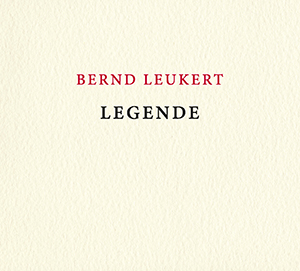Noticias
Entrevista con Bernd Leukert
26/09/2016
Entrevista. La editorial World Edition presenta su último CD: Legende, de Bernd Leukert. Electrónica y composición en una aventura musical electroacústica para desafiar la imaginación del oyente de forma inmediata y directa. Una aventura de la escucha. Hemos hablado con el compositor y esto es lo que nos ha contado.
.jpeg) 1. Ruth Prieto: World Edition has just published your work Legend. What can you tell us about the CD?
1. Ruth Prieto: World Edition has just published your work Legend. What can you tell us about the CD?Bernd Leukert: The pieces, on which you can listen on that CD, are based on sound materials and compositions, which I did within the last five years. Sometimes they were produced for different occasions (electroacoustic concerts, Audio/Visual Performances or radio). But all compositions are revised and changed, some of them are made just for this CD. They deal with art and nature, with the enigmas of sound tales, with the dream of the bird phoenix, with the flying sound of male bumblebees, with prayers from southern India or with the sun song of a Nordic bard.
2. R.P.: What are we going to discover in this work?
Bernd Leukert: You can discover that noise as well often consists of tones, just in the way like tones, which are produced with instruments and they are necessarily partly connected with noises. If one does accept the fact that it is possible to compose with tones, noises, speech, sound space and original sounds from nature, you will notice that those pieces are conditioned by a musicality like any other composition. That means that there is no abstract concept realised, but the sound itself develops sensuously. In this way you can also discover how sounds can be changed, because the process of changing is, for instance by filters or other effects, part of the composition.
"In short: with these experiments of listening you can enlarge your ability to perceive the tonality of everyday life. Because the ear is learning fast."
3. R.P.: What is missing today in the dissemination of music of present-day creation? Does it reach a sufficiently wide audience?
Bernd Leukert: It is well known that small labels, which have programmed contemporary music, are not able to finance a bigger advertising campaign. But the mass media devote themselves to the preferences of the majority. That is the reason why the circle of connoisseurs and lovers is small. Because an audience only can enlarge if it gets information about new releases of contemporary art music.
4. R.P.: Describe the creative process that led to the works on the CD?
Bernd Leukert: The methods of the musique concrète are basic for my compositional work. The acousmatic music opens all frontiers of the availability of sound sources. But a targeted restriction of those sources is artistically wise and useful for their changing, the montage and the possibly polyphonic invoice.
I start with a single sample, which is mostly one of the worked out variations of an original sound. The method is called intuitive: a pre-listening of what after or before this sample could or even ought to appear is initiating the search for it. The target can be a faraway distance of many steps from the available material. And my duty should be to find or to produce the fitting sample. By such blending, additions and parallel settings I control musical courses, which I perceive from the tendency of the material. Nevertheless chance is a big actor. Not all of the experiments are successful, but sometimes I get results which I never expected. I test if they are musically fit. If they are useful, they can change the whole character of the piece.
'Such “mistakes” and surprises are gifts.'
5. R.P.: Where are you right now as a composer?
Bernd Leukert: I don’t have a hiking map in my mind with start and destination, I'v only got an inner compass. And I like to walk on the ridge, where seriousness and frivolity become identical.
6. R.P.: How do you see the contemporary music scene today?
Bernd Leukert: Only a few of the composers, of whose works I knew early, became today modern classics, many others are meanwhile forgotten. After the period of searching, which was called postmodern, today I see protagonists of a young generation, who are divided up into two profiled groups. The one group considers the known compositional work as out of date and put concepts in the foreground, which integrates not only sounds of everyday life utensils but also visual, social, psychological or sociological aspects. The other group opposes show business, new music without ambition and high level, also opposes chatting up with popular genres, that means, the convergence with all, against to which New Music once opposed. Now convincing arguments in shape of compositions ought to come up.
Más información en World Edition

